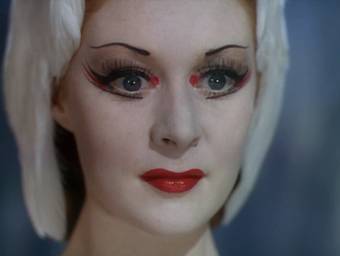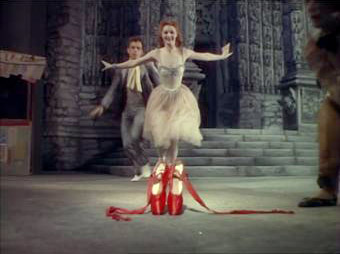|
Ballet?
Ballet? You have got to be kidding. Yeah, yeah. My mother
was constantly reminding me that ballet dancers were fitter
than I was, that they trained harder than any other professional
in any other job. I just shrugged off the girly stuff.
OK, mum. Fine. I was 16 being sucked under by the whirlpool
of raging hormones. It was the year of Star Wars and it still hadn't hit these shores. I had the Meko single,
the pop version of the Williams main theme and Cantina
band and there was nothing in my life except for a huge
chasm of anticipation... And then on BBC 2 that year,
a film was to be televised about ballet. Count me out.
Shame on me (I can retrospectively be shamed). Before
you could say 'pas de deux', I was plonked in front of
the TV with a warning that if I could not regale a girl
friend with the plot the next day, she would cease to
be my friend. Ain't love grand? Hands on hips, achingly
pretty head craned to one side in a sort of physical question
mark, I was suitably challenged. I watched. The next day
I started to babble about the plot, the colour (oh, the
colour), the dancing, the sheer extraordinary surreality
of it (most 16 year olds didn't, to my knowledge, have
a definition of the word 'surreal' cellotaped to their
wardrobe) and above all the superlative editing that slowly
led me to some kind of delayed epiphany. The way the pictures
are put together is where the power resides. This idea
has done more for my career than any other and it was The Red Shoes that led me to it.

It
strikes me as being notable that I have had more revelations
about cinema in the presence of the work of Mr. Powell
and Mr. Pressburger than any other film-makers. They opened
my eyes to what cinema was capable. As Emeric Pressburger
said to his partner, quoted in A.L. Kennedy's excellent
BFI Classic of P & P's The
Life and Death of Colonel Blimp from Pressburger's biography The Life and Death of
A Screenwriter by Kevin Macdonald:
"How
many times have I told you that a film is not words…
It is thoughts and feelings, surprises, suspense, accident."
By
the time the master Lermontov had uttered the question
"Why do you want to dance?" to Vicky Page (soon
to be the dancer in the titular red shoes) I was entranced.
Her answer "Why do you want to live?" struck
a chord so deep I felt like my stomach was having a root
canal. Why did I want to make films? The same answer.
Ambition was a compelling master and it seemed as if P
& P had articulated my deepest goals in a movie about
a ballerina! Those crafty bastards!
The
story of The Red Shoes is easy to summarize
– famed ballet maestro Lermontov finds talented ballerina
Vicky Page, a girl who has the talent to go right to the
top. Her launch pad (the ballet of The Red Shoes) thrusts
her into the public's adoring gaze but love barges in,
in the shape of Red Shoes' composer Eliott Craster. Love
verses a desire or ambition to be the greatest…
It can only and does end in tears. But before the tears,
there are two hours of extraordinary film making and if
there is a central performance that wraps the movie around
itself, it's Anton Walbrook's.
Walbrook
plays the great Boris Lermontov, the powerful ballet impresario.
Here is a man driven by the need to find the zenith of
physical grace. He finds those who aim high and stay aloft
but then become adherents of their own publicity, divas
(goddesses) thrust into Asgard by force of their own self
belief. Even this can do nothing against the brutal march
of time. Lermontov is after someone fresh, someone who
can promise him the stars as he can promise to make them
one. But Vicky Page is not a simple celeb aching to be
adored and recognised the world over. She is a dancer,
a talented and dedicated dancer who works hard for her
fame. Lermontov's players (ranging from Robert Helpmann,
the leading dancer of his day to Leonide Massine, the
Russian ballet dancer) all form a tight knit and tremendously
loyal company who support each other and help cement Lermontov's
starry reputation. Here is a Svengali, more Sven Goran
E., a manager of extreme talent, an organiser of human
resources in the name of art. Lermontov wants to get 'there',
the plateau upon which sit the greats, those who have
pushed their art to another level. The Red Shoes never presents Lermontov as a talent in and of himself
(except perhaps for having the talent to maintain the
illusion of great sophistication and aloofness) but does
illuminate him starkly by giving him one terrible weakness
– he falls in love and utterly denies it within
himself and harshly criticises it in others. He may successfully
fool himself and others in his erotic ankle caress of
the statue of a ballerina's toe balanced foot – he's in
it for the art! But we know better.

There
are several dazzling technical tricks in this sumptuous
treat. I first remember being forced to acknowledge the
editor (or rather what the director had planned to edit
in a certain way, let's not deify editors too much, heaven
forbid) while watching a small ballet company perform.
Vicky Page steps out and in stunning pirouettes, each
accompanied by a POV (stop and think). The Red
Shoes was shot in Technicolor, requiring cameras
the size of freezers. How did they get the pirouette POV?
For once, it may be true that it was done with mirrors.
One
of the most haunting images in a film full of such sights,
is Vicky imploring her husband to take off the red shoes,
the potent symbol of being controlled. Her mad dash to
get away from the two men who represent her specific dilemma
is presented with extraordinary speed and vital shots
go by in frames. Perhaps this was a deliberate ploy on
P & P's behalf. One never really knows if Vicky Page
commits suicide or falls as she's running headlong towards
the only fate she has to submit to.
The
Red Shoes is one of those intensely passionate
movies that entices future ballerinas to squeeze into
the tutu. It's movies like this that prise open the door
so we can begin to recognise that we can be so much more
than the sum of our body parts. We can dance. We can all
dance.
One
trivial aside: in Monte Carlo, where the climax takes
place, there is a scene between Craster and Page and in
the background I could easily be convinced that standing
just outside on the balcony was the demon Pazazou from The Exorcist.
The
mono sound (quite important in a ballet movie) is again
faithfully served by this DVD. No noticeable hiss and
there is clarity throughout.
This
is one particular movie that can be seriously hurt by
a bad print. But this one looks pretty damn fine. Framed
4:3, it looks good enough to eat (a phrase which I'd love
to introduce into the technical specs lexicon). It's just
that you notice all the colours because done well, Technicolor
is extraordinary, and P & P were very explicit about
colour as the flowers and fruit scattered all over the
film testify. They just can't resist the odd splash here
and there and the DVD faithfully recreates the richness
of the colour. On the down side, there is still that tiny
amount of strobing, especially evident in the scene when
Lermontov offers Craster a job. It doesn't by any means
detract from the enjoyment of the viewing but I believe
it has to be a telecine issue (essentially a video camera
rammed down the throat of a film projector). For a print
to become a DVD, it has to be scanned and that means projection.
It's the only aspect of the process that would cause this
odd effect. Let's add "that I know of…"
Side
Note: In direct comparison with the Criterion
Collection DVD of The Red Shoes, the
HMV box set release acquits itself admirably. On the PAL
system, the NTSC Criterion discs have a distinct judder
on some camera movement but unfortunately this is unavoidable
technically speaking.
A
Profile of the Red Shoes (23'53")
Many critics and surviving relatives delightedly give their
accounts of this landmark film. If you love the movie, this
will fascinate.
The
Ballet Of The Red Shoes – Featurette 'Planning The
Ballet' (15'21")
Using Hein Heckroth's sketches, the ballet
is played out like storyboard animatics. The attention paid
to Heckroth's sketches during the actual shoot is mind boggling.
There is a lot of strobing on the lighter sections of this
extra (brightness levels quivering). There is very noticeable
hiss on the quieter passages.
Theatrical
Trailer (2'21")
Proving nothing has changed too much…
The trailer doesn't even hint at what an incredibly 'whole'
film The Red Shoes is. It just regurgitates
what was seen to sell back in the 40s. My favourite part
is the one in which it describes Moira Shearer as "A
Star of Bewitching Loveliness"! As 40s as it gets.
Otherwise The Red Shoes has hardly aged
a day.
Behind
The Scenes Gallery
Revealing production stills – just check out
the size of that fecking camera blimp. "Want a tracking
shot guv'?" They'd need a football team to move that
thing.
In-Depth
Biographies
See earlier piece on AMOLAD.
|